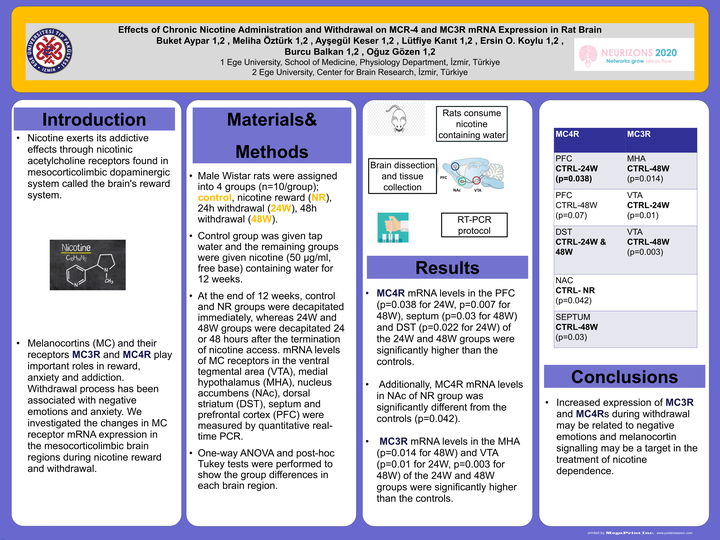Effects of Chronic Nicotine Administration and Withdrawal on MCR-4 and MC3R mRNA Expression in Rat Brain

Abstract
Nicotine exerts its addictive effects through nicotinic acetylcholine receptors found in mesocorticolimbic dopaminergic system called the brain’s reward system. Melanocortins (MC) and their receptors MC3R and MC4R play important roles in reward, anxiety and addiction. Withdrawal process has been associated with negative emotions and anxiety. We investigated the changes in MC receptor mRNA expression in the mesocorticolimbic brain regions during nicotine reward and withdrawal. Male Wistar rats were assigned into 4 groups (n=10/group); control, nicotine reward (NR), 24h withdrawal (24W), 48h withdrawal (48W). Control group was given tap water and the remaining groups were given nicotine (50 μg/ml, free base) containing water for 12 weeks. At the end of 12 weeks, control and NR groups were decapitated immediately, whereas 24W and 48W groups were decapitated 24 or 48 hours after the termination of nicotine access. mRNA levels of MC receptors in the ventral tegmental area (VTA), medial hypothalamus (MHA), nucleus accumbens (NAc), dorsal striatum (DST), septum and prefrontal cortex (PFC) were measured by quantitative real-time PCR. One-way ANOVA and post-hoc Tukey tests were performed to show the group differences in each brain region. MC4R mRNA levels in the PFC (p=0.038 for 24W, p=0.007 for 48W), septum (p=0.03 for 48W) and DST (p=0.022 for 24W) of the 24W and 48W groups were significantly higher than the controls. Additionally, MC4R mRNA levels in NAc of NR group was significantly different from the controls (p=0.042). MC3R mRNA levels in the MHA (p=0.014 for 48W) and VTA (p=0.01 for 24W, p=0.003 for 48W) of the 24W and 48W groups were significantly higher than the controls. Increased expression of MC3R and MC4Rs during withdrawal may be related to negative emotions and melanocortin signalling may be a target in the treatment of nicotine dependence.